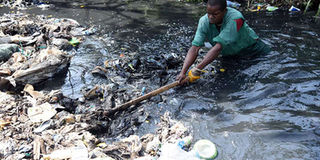‘Toxic flow’ award-winning story, but where is the follow-through?

A member of Komb Green Solutions cleans up a section of Nairobi River passing through Korogocho Slums in Nairobi County on August 28, 2019. The "Toxic flow" series by the Nation traces the pollution of Nairobi River. PHOTO | EVANS HABIL | NATION MEDIA GROUP
What you need to know:
- If the NMG maintains this tempo, we can truly say this is the beginning of the Golden Era of NMG investigative journalism.
John Waithaka thanks the Nation investigative team, including the experts, who brought us the shocking “toxic flow” series.
He says the “award-winning” exposé of the river pollution should not just end there. It needs some follow-through.
The series traces the pollution from Nairobi River, which feeds into the main stream that meanders through several counties to the Indian Ocean.
They begin with the graphic account titled “River of poison”, a four-page story published in the Daily Nation of August 14, 2019.
“God bless you all,” says Mr Waithaka. “Now my Big Question to you: Do you have brochures or booklets of the report? It would help the nation much. It would be a crime if it were all over, ending so abruptly. I hope not!”
The “toxic flow” series has not won any awards. But it will, I believe. There has not been anything like it in the history of Nation Media Group journalism.
In the past few months, the Nation has done exemplary work in investigative journalism.
AWARENESS
Some of the horrifying stories it has published include not only the “toxic flow” series but also the NTV investigation, “The poison in your steak”, published in the Daily Nation of June 15 — a startling revelation that Kenyans are eating meat laced with dangerous chemicals to make it look fresh for longer.
Other stories probing corruption have also been commendable. But the “toxic flow” exposé is arguably the most effective piece of investigative journalism by the Nation. It’s also highly readable.
It contains compelling images. It’s painstakingly, meticulously, and authoritatively written. It’s the result of excellent teamwork and planning.
It uses multiple, named and credible sources. It’s Pulitzer Prize quality. If the NMG maintains this tempo, we can truly say this is the beginning of the Golden Era of NMG investigative journalism.
MEDIA PROGRESS
The NMG has come a long way. So has freedom of the media. The first investigative story that caused a stir was done by yours truly in 1973.
The NMG was then known as Nation Newspapers Limited. The story was first published in the Sunday Nation and repeated in the Monday Daily Nation (June 18, 1973).
The headline, in capital letters, read: “The drug scandal.” The kicker (one that kicks) — used to draw the reader’s attention much like the headline itself — was also in upper case: “Peter Mwaura investigates the multi-million-shilling racket that is making some people rich and is endangering thousands of Kenyans’ lives.”
The first reaction of the government was to arrest me, as if I was the problem.
For two nights, I was detained incommunicado in a tiny room at the CID headquarters (now the Integrity Centre) in Nairobi.
AWARD WINNER
The room’s only furniture, so to speak, was a naked bulb that burned all night and a single wooden bare chair in which I perched all night like a bird, and of course an armed policeman outside the door.
But I had strong support from my Editor-in-Chief, George Githii, who reached to the highest levels of government to get me released.
He sent his own car and driver to take me home after I was unceremoniously released.
It was small comfort for me that in the following year, on March 26, 1974, I was awarded a newly created prize — Kenya’s Pressman of the Year (1973).
The prize was otherwise named the Kenneth Bolton Award for Journalist of the Year. Mr Bolton was the editor of the East African Standard (now The Standard), then a white settler newspaper that was trying to adapt to an independent Kenya.
WHAT NEXT?
The prize was conferred on me by none other than the Permanent Secretary in the Ministry of Information and Broadcasting, John Ithau.
Had the government changed its mind towards investigative journalists? I was not sure. All I remember is what Mr Ithau said in his citation — that I carefully researched my work and was hardly challenged as to accuracy.
Back to the “toxic flow” story. I would like to echo Mr Waithaka. Can we have some follow-through action? Otherwise, the investigation will be just another story.
Send your complaints to [email protected]. Call or text 0721 989 264





